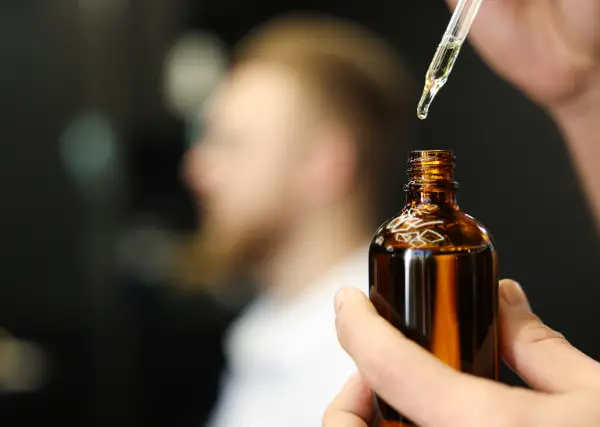A well-groomed, healthy beard is the envy of many, and that's why men everywhere want in on beard-growing secrets.
One of the hyped treatments is using coconut oil for beard growth. It's popular because coconut oil packs diverse nutrients that may boost facial hair growth. It's inexpensive and available in many stores, which makes it a grooming product for any age group.
Therefore, we want to describe the components of coconut oil, how they enhance beard growth, and if there are any considerations you should make before applying some to your beard.
Page Contents
What's in Coconut Oil?
Coconut oil comes from the white endosperm in mature fruit, the edible inner layer that others prefer to call coconut meat. Endosperm packs a variety of nutrients. It has vitamins E and K and iron. Furthermore, this coconut meat contains some protein.
The best component for any man growing his beard is the range of medium-chain fatty acids in pure coconut oil, as this fruit contains lauric, capric, and caprylic fatty acids. These fatty acids supply your follicles with nutrients needed for hair growth. In addition, they're anti-inflammatory, meaning an extra shield to your hair follicles to prevent hair loss.
Even if you've done a few treatments to your beard, such as dyeing and bleaching, using coconut oil may limit protein loss.
Coconut Oil Vs. Other Beard Oils

Beard oil brands promise moisture, hydration, nourishment, and beard length. But when you compare components of the top-selling oils, you find coconut oil good for almost every situation as your beard grows.
One of the beard oils competing with virgin coconut oil is jojoba oil. It has moisturizing components and supplies your follicles with essential fatty acids. However, coconut oil is more affordable, and since you intend to use it until there's a considerable change in your beard hair, the process won't be as expensive as using jojoba oil.
On top of that, beard coconut oil is more suitable for split ends as its thick consistency has more fat content to lock in moisture.
Argan oil also attracts attention in the beard gang because it has linoleic acid, which is rich in vitamin E. Nevertheless, argan won't give you similar benefits to applying coconut oil as the latter has antibacterial properties that keep the skin healthy so that the follicles can function. On top of that, coconut oil exfoliates dead cells for new hair strands to penetrate the skin's surface.
How Coconut Oil Works for Beard Growth
Coconut oil differs from other beard oils because it penetrates the hair shaft and follicles to nourish the roots. Its low molecular weight makes it penetrate more than hydrocarbons like mineral oil. Hence, the components mentioned earlier that promote healthy hair growth reach the spot where the growth process begins.
Further, this oil seals the hair cuticle, preventing moisture loss and protecting your facial hair from environmental damage. For instance, it reduces water absorption, reducing damage from water and moisture. It's the added protection to ensure the new hair doesn't break before it grows to your preferred length.
Since you also moisturize the skin beneath the beard, you create an optimal environment for hair growth, minimizing problems like itchiness and flakiness.
It takes minutes to apply coconut oil to your beard; consequently, adding it to your routine doesn't change what you do in the morning.
How Beneficial is Coconut Oil for Beard Growth?
You're not only looking for length but also a beard that looks and feels healthy. You want hair that is soft with minimal to no hair breakage as you brush your mane. Therefore, the oil you choose for your beard should satisfy those needs. Here are the reasons to add coconut oil to your beard growth routine.
Moisturizes Your Facial Hair
Coconut oil is an excellent natural moisturizer and conditioner for your beard hair and the skin underneath. As such, it prevents dryness and itchiness, two issues you may encounter as your beard grows.
When your beard is dry, it may collect dandruff, and these flakes spread when you brush it. Dry skin is also itchy and inflamed. Such conditions prevent your beard from growing healthy. That's why you need a long-lasting moisturizer like this oil.
Further, this beard oil has conditioning properties to soften facial hair and make it manageable.
Combats Infections
Beard maintenance activities like shaving can cause beard infections. For instance, you may get cuts as you shave and have inflamed follicles. You want to use beard oil that grows your mane and counters infections that may affect beard health.
As such, the lauric acid in this coconut beard oil has antimicrobial properties that may combat potential infections and folliculitis. Therefore, your hair follicles stay healthy and function as they should.
Enhances Hair Strength
When you apply this oil regularly, it strengthens your hair strands, which reduces hair breakage and split ends. As such, your beard grows longer, fuller, and thicker. You see such benefits after continuous use and having a beard routine that keeps your hair clean to absorb the nourishing components of coconut oil.
Enhances a Natural Shine
Coconut oil gives you a natural-looking shine and luster. This sheen lasts all day but doesn't leave a greasy residue.
Since the oil goes down to the roots, even if you have a patchy beard, it has a natural shine from the skin to the tips of your hair. Hence, this oil makes your beard appear healthier. When a beard shines naturally, it's easy to spot problems like flakes and dandruff.
It's a Safer Option
Using pure coconut oil is safer than processed beard oils with chemicals that may harm facial hair and skin. With coconut oil, you have so many options. You can use raw, organic coconut oil pressed from the fruit.
It has a natural, flavorful scent that's perfect for men who like mild scents on their faces. In this unprocessed state, you get all the natural nourishing properties of the fruit.
Read Also: 8 Best Beard Growth Products
Cons of Using Coconut Oil for Beard Growth
Despite the advantages discussed above, there are a few things to note about coconut oil before using it on your face. These problems vary from one skin type to another. Therefore, you may or may not encounter them. But it's also helpful to note the following potential side effects.
Allergic Reactions
Although rare, some people may have allergic reactions to coconut oil. For this reason, start with a patch test like you do when you buy any skin care product. Apply this oil on a small patch to see if your skin reacts to it, then apply it to your entire beard if there are no adverse reactions.
In addition, it's also helpful to use unrefined coconut oil instead of a processed brand mixed with essential oils and other hair-growing ingredients.
Greasiness
Generally, virgin coconut oil has a subtle sheen when applied in small amounts. The shine won't be conspicuous, regardless of your beard thickness. Further, apply coconut oil to a clean beard so it can absorb it adequately. It'll not shine. On the other hand, if you use this oil in large amounts on a beard with product residue, the fat content will coat your hair and make it greasy.
High Comedogenic Rating
One of the reasons many hold back from using coconut oil for beard growth is its likelihood to clog your pores. The skin under your facial hair can get acne as any other part of your face, and if you get acne from comedogenic oils.
Coconut oil may cause a breakout if you have acne-prone skin. Therefore, start with a patch test before incorporating coconut oil into your beard care routine.
But then if you think coconut oil is not for you for some reason, check out our review of the best beard growth products. I’m sure you’ll find one that’ll work best for you.
Individual Results Vary
The oil you use isn't the only factor influencing beard growth. There are many other factors, such as genetics, age, and overall health. While coconut oil can support healthy beard growth, it may not guarantee the same results for everyone.
Some men use it for beard growth and treating infections affecting hair follicles. Hence, they may not get the same results as someone with healthier skin. Some men may use coconut oil infrequently and cause a dry, unhealthy beard, while others overuse it and end up with clogged pores. It's an individual journey.
Conclusion
Coconut oil is one of the cheaper options in the market. Additionally, it's readily available from a local store. When you combine these qualities with the benefits of coconut oil for beard growth, you have every reason to stock some as soon as tomorrow.
However, start slow if you're likely to get acne when you use coconut oil on your face. Start on a small patch every other day and increase the frequency and application area once you're sure coconut oil doesn't clog your pores or cause too much greasiness.
Frequently Asked Questions
How often should I apply coconut oil to my beard?
Apply beard coconut oil about two to three times to nourish your hair throughout the week. However, you can vary this frequency depending on your needs, as this beard oil also helps with problems like beard dandruff. Another factor to guide the frequency is how your beard responds to the oil.
Can I use coconut oil on a patchy beard?
You can use coconut oil to moisturize the skin beneath a patchy beard and promote healthy hair growth. Although applying coconut oil may not magically fill in all the patches, it can contribute to overall beard health.
Can I leave coconut oil in my beard overnight?
Leaving coconut oil in your beard overnight can provide extended moisturization and nourishment. However, rinse it thoroughly in the morning to avoid a greasy appearance.


